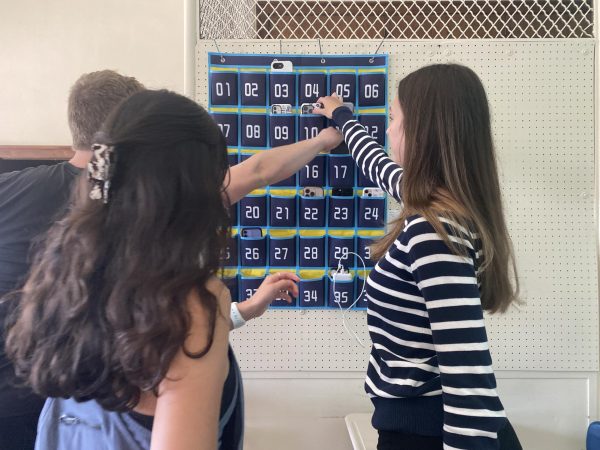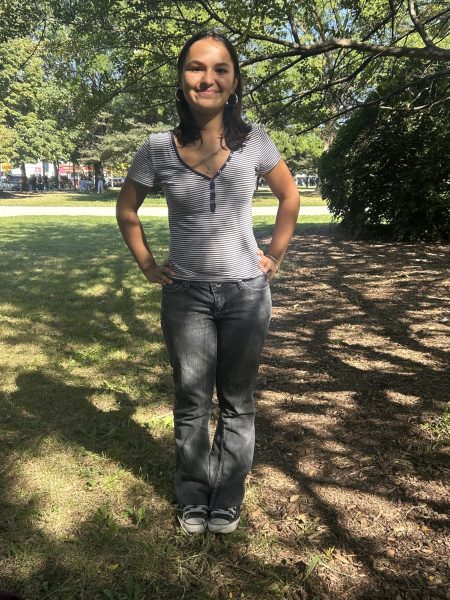Cuban – American student holds out hope for Cuba
Gianna Munoz, Div. 861, was sitting down at her great aunt’s table. Munoz’s aunt was washing dishes. As she told her story, she would stop with a dish in her hand to remember how her early years played out. At other times she would splash the water around or shake a spoon in her hand whenever she talked about something she didn’t like. To the left of Munoz was her grandmother and to her right were her cousins. All gathered around the sparsely decorated kitchen to hear tales about Communist Cuba and their part in it.
“My family was involved in all of this, they were in the middle of what happened in Cuba and they lived through it all; Castro’s reign, the torture, the poverty, they lived through all of it,” Munoz said.
Communist Cuba was once known for its cigars, intolerant leaders, sugar production, and its strained relationship with the United States of America. During the time Fidel Castro dictated over the Caribbean island, ties between the U.S. and Cuba were nonexistent. Events like the Cuban Missile Crisis and the Bay of Pigs left long lasting tension between the two countries that would have to be cut with much more than a knife.
Recently in March 2015 President Obama and new Cuban leader Raul Castro– Fidel Castro’s younger brother– met together in Panama. The historic meeting marks the first time American and Cuban leaders met together since Cuba declared itself communist in 1959. On the agenda: talks about the possibility of abolishing the American-Cuban embargo.
While the possibility of the American-Cuban embargo being lifted is a ways away from becoming reality, here on the homefront, one Lane student is excited about the possibility.
Munoz is of Cuban and Argentine descent. Her grandmother, her great aunt, and most of her cousins on her father’s side were born and raised in Cuba.
“My grandmother left Cuba and then lived in Spain for a few years. From there she left Spain and came to America. She has lived in Chicago for around 30 years,” Munoz said.
Munoz’s grandmother, Nora, is currently visiting from Florida; a state where more than a million Cubans reside – more than any other state in the U.S. Munoz’s aunt, however, lives a mere 15 minutes away from Lane.
“Her name is Ana,” Munoz said.
Upon meeting Ana Diaz one would assume that she is a frail, elderly woman who is soft spoken and wise.
Wise, yes. Soft spoken, not so much.
“My sister and I and my family suffered because of the communism in Cuba,”Ana said, screaming from the stove where she was making black beans and rice.
When Castro became the leader of Cuba, Ana was 13 and Nora was ten.
“We left for political reasons,” Ana said.
Leaving Cuba, while it was difficult for their family, the two sisters firmly believe they had to leave their home country.
“It wasn’t a voluntarily thing. It was mandatory, if you’re not one of them [a communist] they made your life miserable. You could even go to jail which my father did,” Nora said.
Munoz’s great grandfather went to jail because he refused to join the communist party. The communist police broke through his door one day and discovered meat and money – two items of possession that nongovernmental members couldn’t have.
An example of how close the Diaz family was to communism, Ana and Nora’s father went to high school with Fidel Castro.
“My father and Fidel Castro went to school together, the very same high school. My dad knew him and when he came here no one believed him,” Nora said as she helped her sister serve dinner to Munoz and family members who gathered around the table to hear the old stories.
“It’s crazy to think about how close my family was to all this. They had an up close and personal view to everything. It makes you appreciate life so much more,” Munoz said.
When it was time for Ana and Nora to leave Cuba in the early 1960s, they had to leave behind their wealthy lifestyle to go live in Spain. Their father – who was still in jail when the sisters left – used to own a beer company that has been in the Diaz family for generations. But because privately owned businesses were not allowed in a communist state, the company was ripped from the family.
“Fidel Castro has killed so many people. He’s a monster in every sense. He took away my father’s business. He threw my uncle in jail for 18 years and while in jail a communist police officer shot my uncle in the lung and the police removed the bullet without any anesthesia,” Nora said
To escape Castro’s communist rule, the Diaz sisters tried many ways to try to escape Cuba without getting caught.
“We had to go to Spain – we were supposed to go Peter Pan. That was a children’s program for minors getting out of Cuba directly to the United States and they [the children] were placed in foster homes or catholic charities,” Nora said.
But Ana and Nora didn’t go Peter Pan. Their mother didn’t want both of her girls to travel the 90 miles from Cuba to Florida unsupervised. But the sisters eventually did have to leave Cuba because their father thought it was unsafe for them to remain there.
“We applied for visas through Spain and Mexico and Spain came first, they accepted first,” Nora said.
While in Spain, Ana stayed in a catholic school for a year and a half and Nora stayed in a hostel for two years. At the age of 15 and 12, Ana and Nora, respectively had to leave the nest much earlier than most kids do these days.
“It was scary, certainly. We had to leave everything behind: our home, our family, our lifestyle. Everything we’ve ever known was gone,” Nora said.
Ana and Nora traveled to the U.S. they came directly to Chicago because they had a distant uncle who lived here.
“Straight away we looked for jobs. Me and my sister walked up and down Elston looking for jobs. We eventually found jobs in a factory making english muffins. It was a horrible job,” Ana said from the sink after dinner was done and the dishes were being washed.
Ana is currently a retired teacher of 25 years; 20 years with CPS and five years with a private school. She taught mostly Spanish and some French at Kelvyn Park High School and North Grand High School.
“You have to work hard to achieve greatness in this world,” Ana said.
Nora is currently living in Miami working at a beauty salon. Sometimes she dabbles in selling designer purses.
“Nobody is going to tell me that I can’t do something. I can do anything. I said I will make it in this country and nobody believed me but, hey, I did it,” Nora said.
According to the Chicago Tribune as of May 5 the Obama administration approved the first ferry service to Cuba. Baja Ferries, the company that obtained a license from the U.S. Treasury Department can potentially transport people and goods between the two countries. Baja Ferries, however, has not asked approval from Cuba as of yet.
“I feel a sense of relief that it could be lifted because, it’s something that has gone on for too long and needs to be put in the past,” Munoz said.
Munoz said she would like to visit Cuba one day. She has aunts, uncles, and cousins that she has never met before. She wants to see where her grandmother and aunt grew up. Ana and Nora repeated the same sentiment. The nieces and nephews that still lingered were interested to hear about what Cuba was like and if the beaches were as pretty as everyone makes them out to be. One nephew even asked if the cigars lived up to the hype.
“I don’t know if I’ll ever go back. I want to go back because I want to take my grandkids and my son and my daughter to show them where I come from,” Ana said.
“It’s such a beautiful country. It’s my home, of course I want to go back. Maybe one day. I think it’s important for my family to see where me and my sister come from. If you don’t know your roots how can you know where you’re going moving forward?” Nora said.
Ana and Nora and the entire Diaz family holds out hope that one day the embargo between the two countries will be lifted. But until then, they will settle for knowing that they still have their family history.
“My family is apart of history. They lived through this and survived. It’s amazing. It’s inspiring,” Munoz said.
Your donations directly fund the Lane Tech student journalism program—covering essential costs like website hosting and technology not supported by our school or district. Your generosity empowers our student reporters to investigate, write, and publish impactful stories that matter to our school community.
This website is more than a publishing platform—it's an archive, a research tool, and a source of truth. Every dollar helps us preserve and grow this resource so future students can learn from and build on the work being done today.
Thank you for supporting the next generation of journalists at Lane Tech College Prep!



